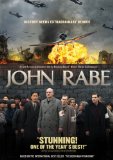| Reviews & Columns |
|
Reviews DVD TV on DVD Blu-ray 4K UHD International DVDs In Theaters Reviews by Studio Video Games Features Collector Series DVDs Easter Egg Database Interviews DVD Talk Radio Feature Articles Columns Anime Talk DVD Savant Horror DVDs The M.O.D. Squad Art House HD Talk Silent DVD
|
DVD Talk Forum |
|
|
| Resources |
|
DVD Price Search Customer Service #'s RCE Info Links |
|
Columns
|
|
|
John Rabe
THE MOVIE:
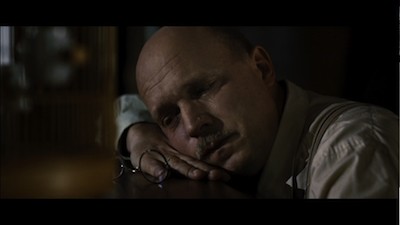
Writer/director Florian Gallenberger's John Rabe tells the story of little-known historical figures who took a major part in the relief efforts during the Nanking Massacre in 1937. The event, alternately known as "The Rape of Nanking," is one of the most contentious tragedies of the second World War. The Japanese government to this day refuses to acknowledge that the massacre happened, but evidence shows that following the destruction of Shanghai, Japanese troops moved into Nanking and slaughtered hundreds of thousands of Chinese citizens and raped untold numbers of the women. It's a brutality that has never fully been answered for.
At the time, many foreign countries had embassies and other concerns in Nanking. German national John Rabe (played by Ulrich Tukur from The White Ribbon) had been in China for 27 years running the Nanking bureau for Siemens manufacturing, and under his supervision, a power plant had been built that powered much of the city. December 1937 was to be the end of his tenure in the region, he was being promoted to a position back in Berlin and, as it turns out, the Siemens operations were to be dismantled. Rabe was a Nazi, though largely in name only. At least as portrayed here, he was too far away to really be invested in the movement, and he quickly butts heads with his party-assigned replacement (Mathias Herrmann).
Just before Rabe is about to leave, the Japanese begin their siege. Fighter planes strafe the city and drop bombs, and only a Nazi flag keeps Rabe's factory workers from being killed. Despite his better judgment--it would be much easier to go as scheduled--Rabe joins a coalition to build a safe zone within the city where Chinese civilians can take sanctuary from the fighting. Among those joining him are Dr. George Rosen (Daniel Brühl, Joyeux Noël), a German diplomat of Jewish extraction; Valérie Dupres (Anne Consigny, A Christmas Tale), a French teacher who runs a school for girls; and the principled, sarcastic American medical doctor, Robert Wilson (Steve Buscemi, The Big Lebowski). Together, they negotiate with the Japanese and try to keep over 200,000 people safe until order can be restored.
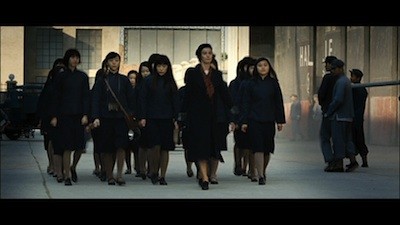
The plan works, though over the month or so that the movie takes place, each member of the committee will be tested. How far will they go to save a life? What price will they put on survival? Though John Rabe is the man of the title, the movie gives each of these characters their due. Gallenberger tries to examine the situation from all sides, including showing the Japanese planning their attack. Though most of the Japanese officers skirt close to being cartoon villains, there is a voice of dissent that tries to approach conquering the city more strategically. Perhaps the only side that doesn't get enough screen time is the Chinese, with only a couple of minor characters getting roles of any substance. Most notably, the young girl Langshu (Jingchu Zhang, Rush Hour 3), a photographer who is encouraged to pursue her art by Valérie and very nearly engages in a romantic subplot with Rosen. She regularly pushes the boundaries of what she can do within the confines of the lockdown, and her rash actions provide John Rabe with one of its most uncomfortable scenes, when a Japanese officer forces her dormitory to strip to prove they aren't harboring a male soldier.
John Rabe is a well-told story. Sections of modern Shanghai stand in for the ruins of Nanking, and Gallenberger creates an excellent period atmosphere. She stages a few large sequences, directing an army of extras to show the Japanese army mobilizing and also gatherings of the Chinese citizenry. She doesn't shy away from the atrocities, but she doesn't engage in unnecessary gore, either. She creates just the right balance so that the audience is as horrified as her characters.
Most of the movie works, even though it sometimes strays into cliché. Buscemi's character is like a caricature of the righteous American seen in many a wartime Hollywood film, and the actor overplays it, as well. Daniel Brühl, who was so charming as the German action hero in Inglourious Basterds, is less convincing here, his clean good looks and even-toned delivery often making it seem like he is playing dress-up rather than fully committed to the role. The standout performance, thankfully, comes from Tukur, who has to go from cocksure industrialist to being a weakened, broken man. He starts by having faith in the fundamental rightness of things, but ultimately ends up caring about saving more lives than he does about his reputation or his bank account. Yes, it's very reminiscent of Schindler's List, and John Rabe suffers in comparison to that film. (I know it's an outré opinion, but I still think Spielberg made an exceptional piece of cinema there.) Gallenberger doesn't really find a way not to make Rabe's last stand against the Japanese come off as hokum, especially with the convenient arrival of the diplomatic cavalry. The final ten minutes of the film seem exaggerated. It may be true, Rabe may have been that celebrated at the time, but as the finale of a movie, it feels contrived.
Those caveats aside, John Rabe is a pretty good slice of historical drama. The story is fundamentally compelling, and the circumstances of the Nanking Massacre have not gotten nearly as much cinematic coverage as most other aspects of WWII. The art direction is spot-on, and the script keeps moving while only getting preachy once or twice. If this sort of thing is your sort of thing, John Rabe should deliver what you're after.
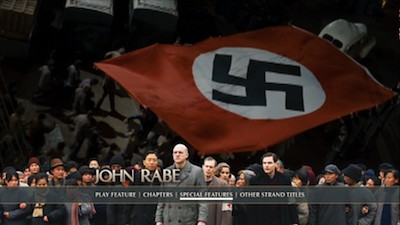
THE DVD
Video:
My copy of John Rabe didn't come with any packaging, and though I believe the disc to be the final version that will be released to retail outlets, I do not have any confirmation of the technical specs. Even knowing that, the picture quality on the disc is excellent. There is a nicely rendered color palette, and resolution is very good, though there is some interlacing. The original 2.35:1 aspect ratio is preserved here.
Sound:
John Rabe has a multilingual soundtrack, including German, English, Japanese, and Chinese. The audio is mixed in stereo and sounds good, though sometimes whispered words can be hard to hear even when my player was at a reasonable listening volume. Most of the mix is pretty well centered, there wasn't a lot of fancy between speaker effects.
The non-English scenes have English subtitles that play automatically and cannot be turned off.
Extras:
There is a trailer for John Rabe, as well as other Strand releases, and a menu page advertising the John Rabe soundtrack.
FINAL THOUGHTS:
Recommended. John Rabe is a well-made WWII drama that, despite sometimes feeling very familiar, covers territory that has not gotten all that many movies made about it. Detailing the Nanking Massacre of 1937 is a pretty big undertaking, so writer/director Florian Gallenberger takes us to the center of the city as the Japanese attacked, showing how a collection of foreign citizens, led by a German industrialist named John Rabe (Ulrich Tukur), banded together to create a safe haven for the common people caught in the combat. All those involved have their moral limits tested as they put everything they have into saving lives. John Rabe sometimes gets a little rah-rah for its own good, but the story is fascinating and Gallenberger's re-creation of the time period is exceptional. Worth checking out.
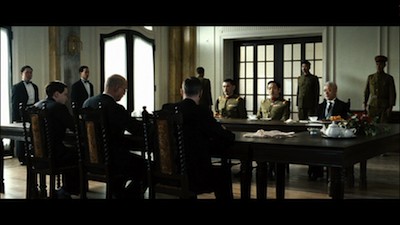
Jamie S. Rich is a novelist and comic book writer. He is best known for his collaborations with Joelle Jones, including the hardboiled crime comic book You Have Killed Me, the challenging romance 12 Reasons Why I Love Her, and the 2007 prose novel Have You Seen the Horizon Lately?, for which Jones did the cover. All three were published by Oni Press. His most recent projects include the futuristic romance A Boy and a Girl with Natalie Nourigat; Archer Coe and the Thousand Natural Shocks, a loopy crime tale drawn by Dan Christensen; and the horror miniseries Madame Frankenstein, a collaboration with Megan Levens. Follow Rich's blog at Confessions123.com.
|
| Popular Reviews |
| Sponsored Links |
|
|
| Sponsored Links |
|
|
| Release List | Reviews | Shop | Newsletter | Forum | DVD Giveaways | Blu-Ray | Advertise |
|
Copyright 2024 DVDTalk.com All Rights Reserved. Legal Info, Privacy Policy, Terms of Use,
Manage Preferences,
Your Privacy Choices | |||||||









